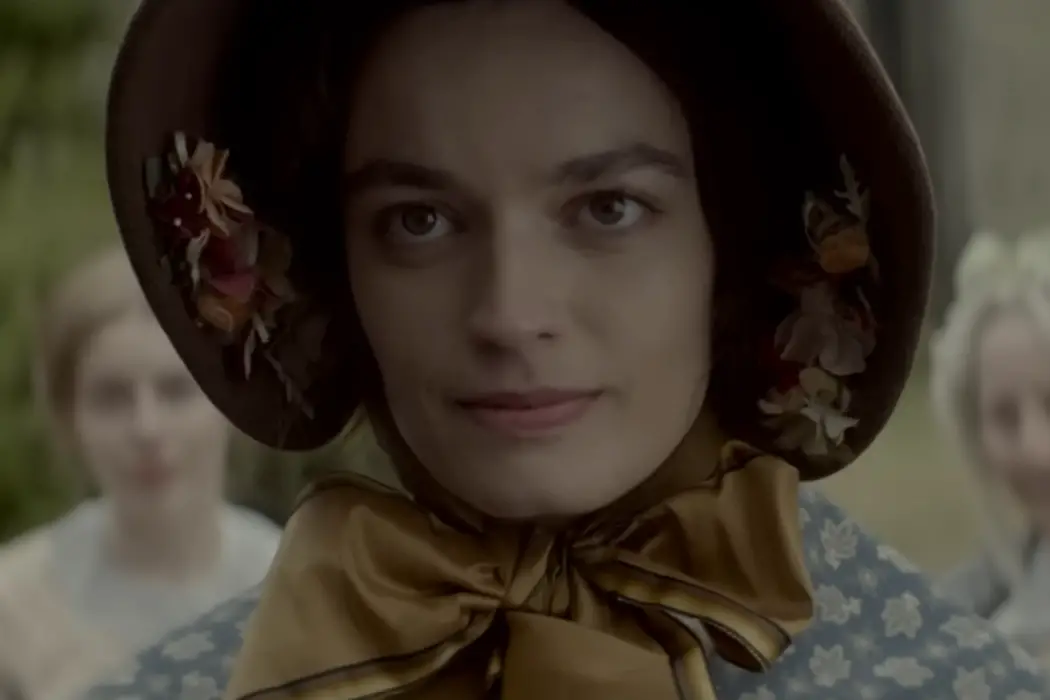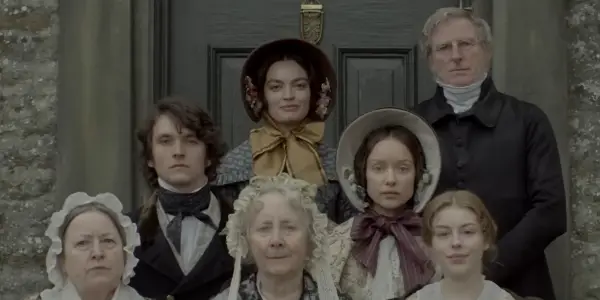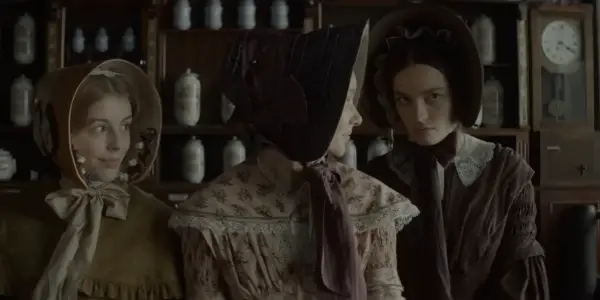EMILY: Frances O’Connor’s Brontë Film Is Less Biopic, More Tragic Romance

Film critic, Ithaca College and University of St Andrews graduate,…
I stole a copy of Wuthering Heights from my university’s English department about a year ago. Naturally, it’s been gathering dust on my bookshelf ever since. Not only have I not read the book, but I also know nothing about the story nor the life of its author, Emily Brontë, the subject of Frances O’Connor’s new film, Emily. In some ways, I suppose I’m the least qualified critic to be reviewing this film. But I’m on a deadline, so the dust is just going to have to keep gathering on Wuthering Heights.
Whether you’ve read it or not doesn’t matter anyway; the film is about the woman, not her novel. Emily is a bold introduction to the writer: She’s here to do opium, fall in love, write a great novel, and die… and she’s all out of opium.
All About Emily Brontë
Brontë is a mysterious sort, and it would seem that scholars have difficulty piecing together her life due to its brevity (she died at 30). There’s not been much written about Brontë, either, so scholars have resorted to reading her diaries — the diaries of a 16-year-old girl — to discover more about her life. Kinda f*cked up to treat her personal diaries as essential autobiographical texts.
Scholars have called Brontë a visionary poet, an intellectual but lonely soul, a proud nonconformist, a feminist, and a shy romantic. O’Connor reinvents Brontë as a normal woman, not a literary hero. The drama is neither fanciful nor genuflectory. On a sliding scale between proper film and “annoying Wikipedia entry,” it’s more Little Women than it is Tolkien.

Absorbing all of these interpretations of Emily Brontë and embodying her own, actress Emma Mackey is impossible to take your eyes off of. Her Emily is doelike, angry, clever, and wistful. She can roast you in French and stare daggers at you across the room. Many of the film’s best scenes are built on the glances of its characters rather than their dialogue.
Abel Korzeniowski’s fiery string score accentuates all of Emily’s smallest movements. The composer, known for soul-crushing scores for films like Nocturnal Animals and Till, turns every rainstorm into a tempest, every kiss into a symphony, and every run into a race for freedom.
As for its plot, Emily skates along fairly familiar territory if you’ve ever seen a Jane Austen adaptation or any other breeches-and-ball gowns film. Act One introduces us to the Brontë family with its overbearing patriarch (Adrian Dunbar) and Emily’s anarchic brother (Fionn Whitehead). Curiously, for this stretch of the film, Emily strays from the typical biopic trappings; O’Connor’s interests lie less in the writer’s literary pursuits than they do in Emily’s daily life and her struggles to hold onto her independence in a rigidly conservative society.
Then, O’Connor delights in putting Emily in a Gothic romance of her own. Her sexual and romantic relationship with the new curate, William Weightman (Oliver Jackson-Cohen), feels more literary than real — apropos, since the real Weightman was actually Anne Brontë’s lover, not Emily’s. The filmmaker is likely going to get dozens of letters from stuffy college English professors about the implications Emily makes, but O’Connor cheekily covers her tracks by having Emily demand that her love poems be destroyed upon her death. It doesn’t matter how much of the film is fictional, anyway — it’s boring to labor over how much of a biopic actually happened. Also, Mackey’s version of Emily Brontë would probably track me down and punch me if I keep nitpicking the film’s historical accuracy.
Okay, But How Sexy Is It?
For his part, Jackson-Cohen nails Weightman’s deep English repression. But he’s also hot, in a deeply-repressed-Englishman sort of way. While William’s cinderblock jaw and muddy-hued suits add to the character’s sexy smolder, he is, alas, still a man, so Weightman is equal parts romantic interest and obstacle. Only, Mackey’s Emily is not having any of his shit. As far as 19th-century female protagonists go, she’s less Elizabeth Bennet from Pride & Prejudice and more Elizabeth Bennet from Pride and Prejudice and Zombies.

Maybe the most obvious comparison between Emily and the works of Jane Austen is in how they portray and challenge gender roles in the 1800s. Stories about women in the 19th century and earlier are usually quite similar in that their protagonists have little freedom afforded to them. I’m reminded of the first Jurassic Park film, in which we’re told that the velociraptors spend their days attacking different sections of the electrified fence, searching for weaknesses. I should think Emily Brontë would be pleased to be compared to a velociraptor — after somebody explained to her what one was — and Mackey’s Brontë guts and eviscerates people, albeit with her words rather than raptor claws.
The film might be half-romance, but at no point does Weightman appear to be the hero here. He’s a yoke, an anchor, and an inconstant annoyance. Crucially, the film makes clear that Weightman isn’t the solution to Emily’s feelings of powerlessness and directionlessness. She becomes a tragic figure in O’Connor and Mackey’s hands. Whether she was a genius or not isn’t their primary concern; she’s first and foremost a human being, and she spent her whole life being subjugated, diminished, and sapped of agency. “I am a fish,” Emily says in the film, terrified of never accomplishing anything. “And so I am destined to be stuck here in this backwater, this pond.”
Séances And Opiates
I believe people use books and movies the same as drugs: Where our bodies cannot find freedom, we must free our minds. Emily Brontë and her brother, Branwell, do a lot of opium throughout the film. Emily finds comfort and adventure in the act because of her confinement. Her house is secluded, her father doesn’t care about his children, and he has a very narrow idea of what Emily should be allowed to do. She can only venture out mentally.
Not only does her drug use make sense in the film, but it also helps set Emily apart from legion other period pieces. Some directors favor modern needle drops or ironic line deliveries to make their movies feel modern, but Emily achieves it through emotional honesty, bold feminist aspirations, and realistic depictions of drug use that are otherwise uncharacteristic of the genre.
The drug use connects to Emily’s running motif of masks. There’s the mask Emily assumes in the company of her father and in the church, which, as the film creeps toward its two-hour mark, is a mask Emily’s putting on more and more. Soon, she’s always wearing it, only taking it off to lash out at Branwell and her sister Charlotte (Alexandra Dowling). With a little practice, she’s able to present a facade of grace and propriety while on the inside, she’s either full of rage or tripping balls.

And then there’s the literal mask Emily wears in the film, a porcelain doll-like mask that, according to her dad, the Brontë kids like to wear and pretend to be various literary and historical figures. So the Brontës and Weightman gather around the dinner table by candlelight and take turns playing the mask game. When it comes to Emily’s turn, she’s silent. Then her spine straightens, her chin lifts, and she begins speaking to her sisters and brother as their dead mother. Talking about how much she misses them.
Maybe it’s an act. Maybe Emily’s just flexing her storytelling muscles and playing into her family’s grief. But the sisters also fall apart, tearfully seizing the chance to finally talk to Mom again. Wind rattles the windows behind Emily. The air feels like it’s been sucked out of the room. It feels like Emily’s made room for ghosts.
Conclusion:
The moors have never looked so lonely as in Emily. Brontë huddled in a tiny cottage, waiting to see Weightman’s 6-foot figure walking across the field to her, is one of the most indelible, tragic film images of the year. And O’Connor, who before her directing career was a performer in films like A.I.: Artificial Intelligence, The Importance of Being Earnest, and Iron Jawed Angels, knows that Mackey is a compelling actress, that she can convey more with her cantaloupe-sized eyes than most actors can with their whole bodies. The two complement each other beautifully.
I did wonder halfway through the film why O’Connor didn’t just want to have a crack at adapting Wuthering Heights instead. The moors, the ghosts, the romance… it feels like there’s plenty in common between Brontë’s novel and her biopic. But then, there’s that scene with the mask, and not only does the image of it seared into my brain give me goosebumps, but it also makes me understand the appeal of the Brontë story over that of Wuthering Heights.
There’s a central, almost callous, irony to the film. In its first minutes, her sister asks, “Why did you write Wuthering Heights?” And in the final minutes, we return to that question. But the film’s never really concerned with the why and how of novel-writing — plenty of boring movies have been there and done that. Everything between those scenes is a study of this woman who was never allowed to achieve the things she wanted to. Emily Brontë was born in the wrong time to be a human being with freedom, rights, and happiness, but she was born at the right time to be a good writer. Ain’t that a kick in the head?
Emily was released in the United States on Feb. 17, 2023. It’s in theaters now.
Watch Emily
Does content like this matter to you?
Become a Member and support film journalism. Unlock access to all of Film Inquiry`s great articles. Join a community of like-minded readers who are passionate about cinema - get access to our private members Network, give back to independent filmmakers, and more.
Film critic, Ithaca College and University of St Andrews graduate, head of the "Paddington 2" fan club.













